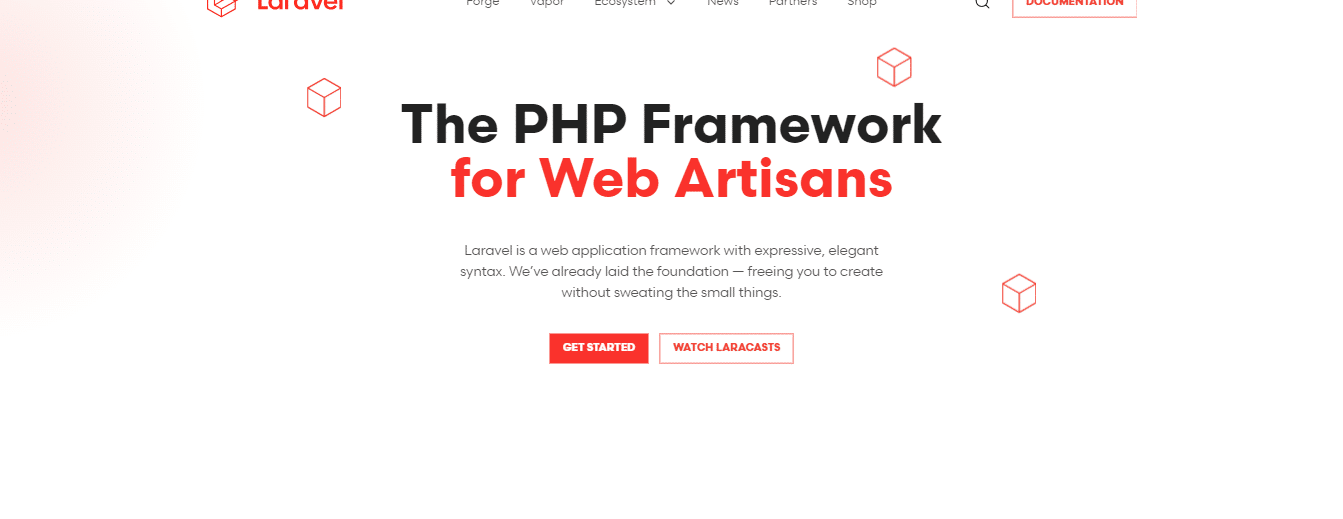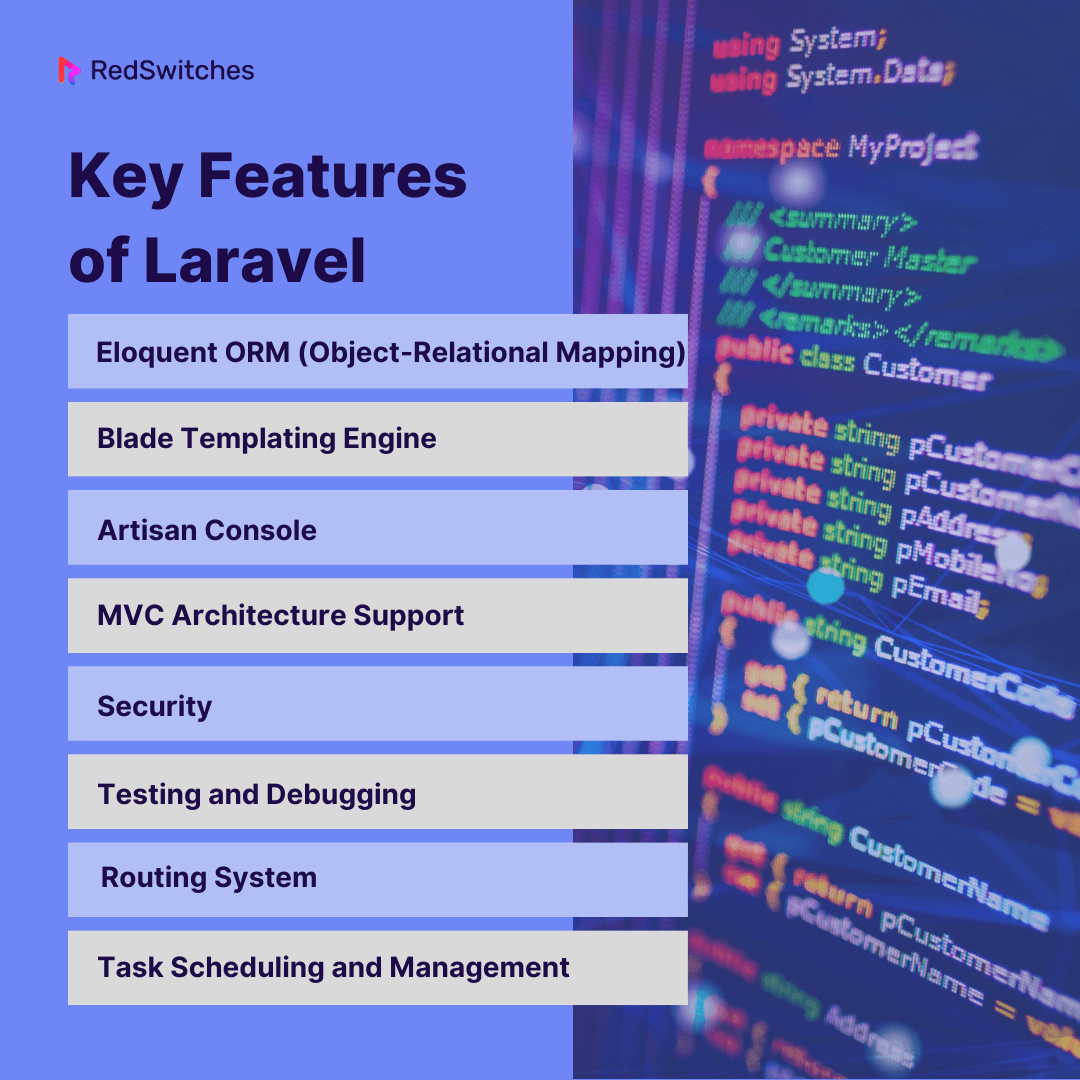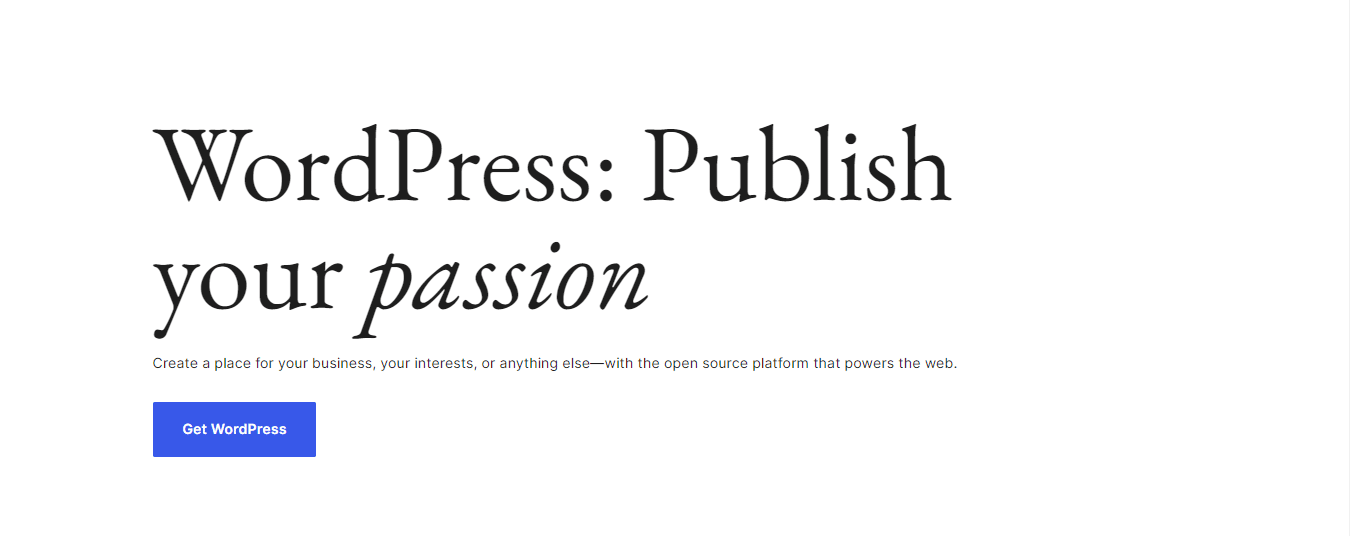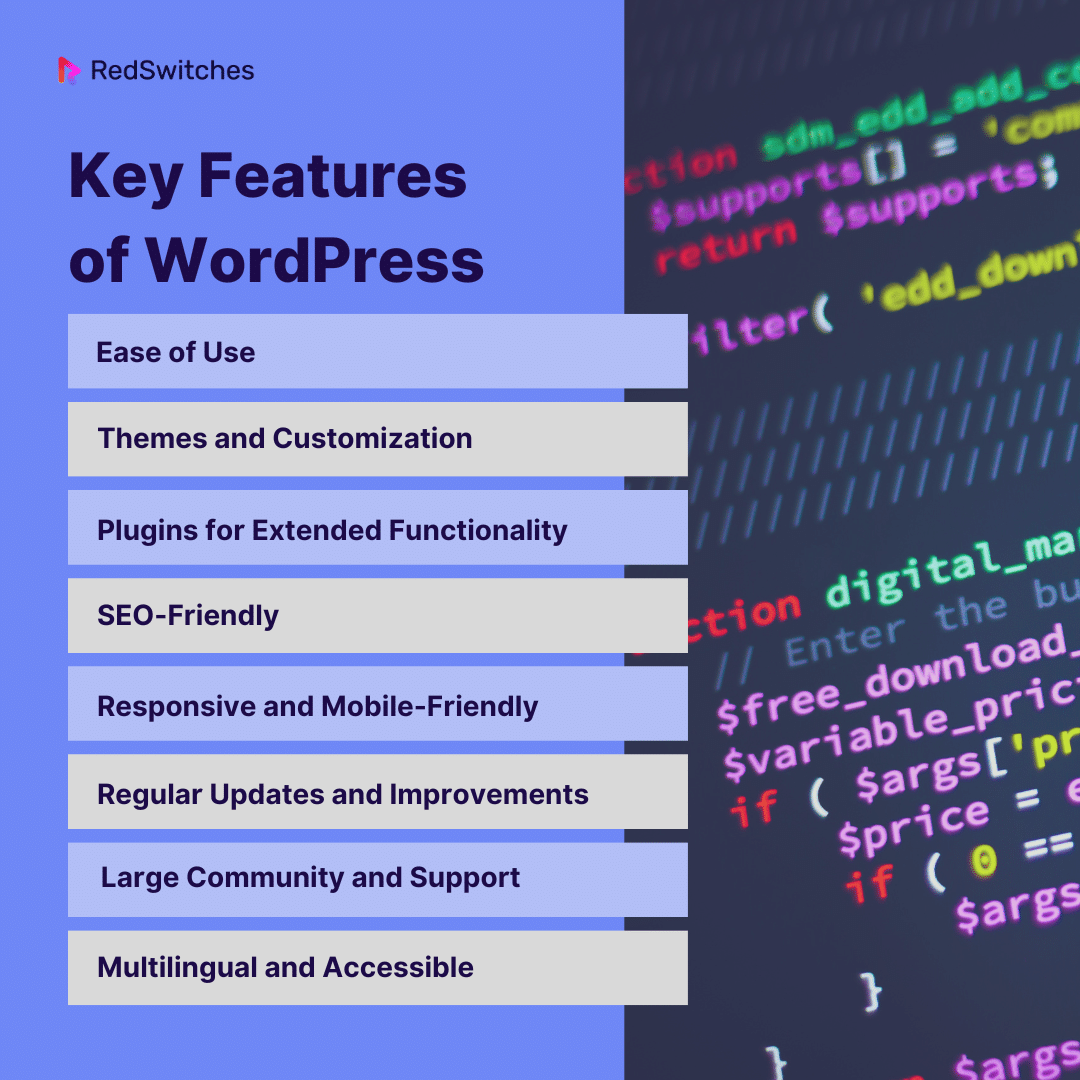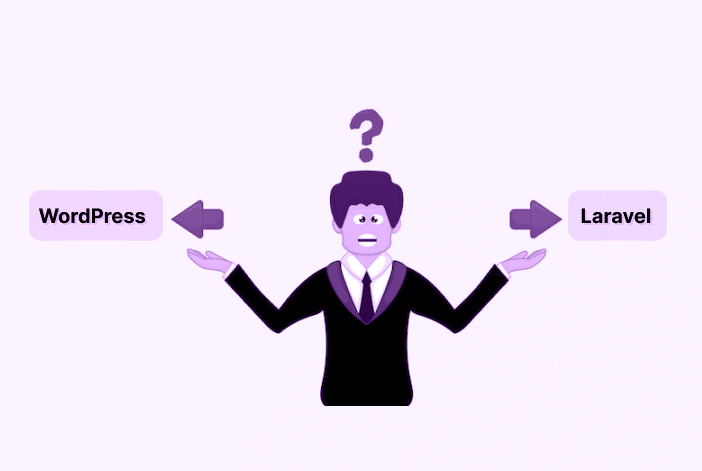Key Takeaways
- Laravel is a PHP framework ideal for complex, custom web applications. Emphasizing scalability and developer control.
- WordPress is a user-friendly CMS perfect for content-driven websites. Offering ease of use with extensive themes and plugins.
- Laravel uses MVC architecture for organized coding and efficient application development, enhancing maintainability and scalability.
- WordPress thrives on its user-friendly interface and community support. Making web development accessible to non-technical users.
- Laravel offers advanced features like Eloquent ORM, Blade templating, and Artisan console. This is for sophisticated web development.
- WordPress is renowned for its SEO-friendly nature and a vast array of plugins for extended functionality and customization.
- Scalability is a strength of Laravel. Making it suitable for large-scale applications. While WordPress is better for smaller to medium-sized sites.
- Laravel has a steeper learning curve due to its technical complexity. Whereas WordPress is easier for beginners.
- Hosting for Laravel may require specialized services. Whereas WordPress is compatible with most hosting providers due to minimal requirements.
- Combining Laravel and WordPress can leverage Laravel’s custom development capabilities. With WordPress’s content management ease for unique project needs.
In 2024, web development has two big names: Laravel and WordPress. Each has its special place in building websites, catering to different needs.
Laravel is a PHP framework known for making coding simpler. It’s great for companies that want custom, creative web designs with complex features. It helps with coding, offering tools for caching, optimizing queries, and organizing databases. This makes Laravel perfect for projects that need to be fast and scalable.
WordPress started as a blogging tool but became a full content management system (CMS). It’s now used to create all kinds of websites without much coding. Its strength lies in its huge selection of themes and plugins, making it ideal for those who aren’t tech-savvy. WordPress is known for being user-friendly, with a big community for support.
These platforms offer different ways to build websites. Laravel is for those who need powerful technical features. WordPress is for ease and accessibility, with lots of customization options.
This comparison will help you understand Laravel vs WordPress better. Whether you’re an expert developer, a beginner, or a business owner making tech decisions, this guide will help you choose the right platform.
Table of Contents
- Key Takeaways
- What Is Laravel?
- What Is WordPress?
- Laravel vs WordPress: Head-to-Head Comparison
- WordPress vs Laravel: Let’s Find Out What Works Best for Whom
- Can Laravel and WordPress Be Used Together?
- Conclusion
- FAQs
What Is Laravel?
Credits: Laravel
When we talk about Laravel versus WordPress, it’s important to know what each one does best. Laravel is a special tool for creating websites. It’s made for people who build web applications and want something strong, able to grow, and easy to change. People like it because it makes writing code simpler and helps with common jobs such as setting up web pages, logging in users, and keeping data safe. Laravel is perfect for making complex websites because it has lots of helpful tools and a clear way of doing things.
Also Read CodeIgniter vs Laravel: Which PHP Framework to Choose in 2024?
Laravel Architecture
Laravel is great for building websites, and it stands out from WordPress because of its organization. It uses something called the Model-View-Controller (MVC) framework. This means it splits the app into three parts: the Model (this is where it deals with the database), the View (what people see on their screens), and the Controller (which connects the Model and View). This setup helps keep everything neat and makes managing how users interact with the site, handle the database, and show data easier.
In Laravel, the Model is all about the data and the rules of the app. The View is about displaying this data. The Controller takes user requests, works with the Model to update the data, and then decides which View to show. This makes maintaining and updating the app a lot smoother.
Laravel also has some cool features. It has simple ways to manage web traffic, a fancy database tool called Eloquent ORM, and a strong tool for making the front-end look good (the Blade templating engine). Plus, Laravel has many libraries and allows for adding more features, so developers can really customize their web projects, no matter if they’re small blogs or big, complicated websites.
When you compare Laravel to WordPress. Laravel’s setup and features make it a top choice for developers who want a powerful and neat way to build websites.
Key Features of Laravel
When comparing WordPress and Laravel, knowing what makes Laravel special is key. Laravel is famous for its features that make building websites easier and more powerful.
- Eloquent ORM (Object-Relational Mapping)
This is a fancy way of saying Laravel helps you talk to databases more easily using PHP, instead of the harder SQL language. This makes it simpler to handle data and keep your code neat. - Blade Templating Engine
Laravel uses something called Blade to help you make web pages quickly. It lets you mix PHP code directly in your web pages, which makes creating and fixing them easier. - Artisan Console
Laravel comes with a tool called Artisan that does a lot of the boring coding tasks for you, like setting up databases. This saves you time and hassle. - MVC Architecture Support
Laravel uses a system called MVC (Model-View-Controller) which makes your app run better and keeps your code organized. It helps separate your app’s data, how it looks, and how it works, making it easier to manage. - Security
Laravel is very focused on keeping things safe. It has built-in ways to protect your site from common dangers like hacking and spam. - Testing and Debugging
Laravel is made to be tested easily, meaning you can check your app works right and fix any problems without too much trouble. This helps make sure your app is reliable. - Routing System
Laravel lets you set up what happens when users visit different pages on your site straightforwardly. This makes managing your site’s navigation simple. - Task Scheduling and Management
With Laravel, you can easily set up tasks to run automatically, which means less work for you to keep your site updated and running smoothly.
In the Laravel vs WordPress discussion. These features of Laravel depict it as a comprehensive and developer-friendly framework. Laravel is particularly suitable for projects involving complex backend logic and extensive customization. Its robust tools and features allow the creation of sophisticated, high-performing web applications.
Also Read CakePHP vs Laravel: 13 Crucial Differences
What Is WordPress?
Credits: WordPress
When discussing Laravel vs WordPress, knowing what WordPress offers is important. Unlike Laravel, which is a tool for building websites, WordPress is a very popular tool that lets you manage content on your website. It started in 2003 mainly for blogs, but now it’s used for all sorts of websites like business sites, online stores, portfolios, and more.
One big reason people like WordPress is because it’s easy to use. You don’t need to know a lot about coding to make a website with it. This makes WordPress a good choice for beginners and people who have been making websites for a long time. Because it’s so user-friendly and flexible, lots of websites on the internet are made with WordPress. It shows how versatile and popular WordPress is.
WordPress Architecture
When looking at Laravel vs WordPress, getting what WordPress is built on is important. Unlike Laravel, WordPress is not just for building applications but is a popular tool for making all kinds of websites. It started for blogs but now works for business sites, online shops, and more.
WordPress is user-friendly, making it a good pick for people just starting out and for experts too. It lets you set up and change your site without needing to be a coding pro. This has made WordPress very popular, powering many websites worldwide.
WordPress is special because it lets you add new features through plugins. Whether you want to add a form, make your site appear better in search engines, or start selling things online, a plugin can probably do it. This makes WordPress very flexible, fitting lots of different needs.
Then there are WordPress themes, which decide how your site looks. There are thousands to choose from, from simple to fancy ones, and you can change them to fit your site’s look. This includes changing colors, and layouts, and even adding your design touches.
WordPress uses PHP and MySQL at its heart, with a core code that handles the basic stuff a website needs to do. This core gets updates from people worldwide, helping keep WordPress safe and up-to-date.
WordPress also has widgets and menus that make adding content and features easy. Widgets can put calendars or search bars on your site, and menus help people find their way around.
A big part of WordPress is its community. So many people use, make, and teach WordPress that it’s always growing and improving. This community means there’s a lot of help, from themes and plugins to advice on how to do things.
In the debate of Laravel vs WordPress, WordPress is great for those who want an easy way to make and manage a website. It’s especially good if you want many options for adding features and a big community for support. WordPress is about making website building accessible to everyone, not just coders, with its easy-to-use themes and plugins.
Also Read How to Set Up a WordPress Staging in 2024?
Key Features of WordPress
When we compare Laravel vs WordPress, it’s important to see what makes WordPress so popular for making websites. WordPress is really easy to use, flexible, and comes with lots of features for all kinds of users, from beginners to experts.
Ease of Use
WordPress is known for being very user-friendly. You can easily add new pages, posts, and themes without much technical knowledge. This makes WordPress great for people who aren’t tech-savvy.
Themes and Customization
WordPress offers tons of themes. These themes decide your website’s appearance and can be changed to fit your style. With so many free and paid themes available, you can find the perfect look for your site.
Plugins for Extended Functionality
With WordPress, you can add extra features to your site using plugins. Need SEO tools, contact forms, or an online store? There’s probably a plugin for that. This lets you do more with your website.
SEO-Friendly
WordPress is good for SEO, which can help your site appear in search engines. It has features that simplify creating SEO-friendly content, plus plugins like Yoast SEO to help even more.
Responsive and Mobile-Friendly
Nowadays, websites need to work on phones, too. WordPress ensures your site looks good on any device, which is essential for keeping visitors happy.
Regular Updates and Improvements
WordPress is always being updated. These updates make your site more secure and add new features, so you’re keeping up with web trends.
Large Community and Support
One big plus of WordPress is its huge community. Many people are ready to help, whether through forums, tutorials, or guides. This means it’s easy to get help or learn new things.
Multilingual and Accessible
WordPress supports content in many languages, making it great for a global audience. It’s designed to be inclusive, reaching as many people as possible.
In the debate between Laravel and WordPress, WordPress stands out for anyone who wants an easy-to-use platform with many customization options and a strong support network. It’s especially good for websites focused on content, like blogs, small businesses, and online stores that need a friendly interface and many features.
Also Read PHP vs JavaScript: Choosing the Right Scripting Language in 2024
Laravel vs WordPress: Head-to-Head Comparison
Credits: Freepik
In this pivotal section of our Laravel vs WordPress analysis, we reach the crux of our exploration — a head-to-head comparison. This comparative evaluation aims to dissect and juxtapose the key features, capabilities, and use cases of Laravel and WordPress. By delving into their strengths and limitations, we’ll offer a clearer perspective on how these two platforms stand against each other in various aspects of web development.
Whether you’re a developer, a business owner, or just someone fascinated by the realm of web development, this comparison will provide valuable insights to help you make an informed decision. From their architectural frameworks and ease of use to scalability, performance, and community support, we will scrutinize each aspect to understand which platform could be the right fit for your specific web development needs.
Join us as we navigate this comparative journey, unraveling the intricacies of Laravel vs WordPress and shedding light on the ideal scenarios for each platform’s use.
Purpose
Credits: Freepik
In the Laravel vs WordPress debate, understanding the primary purpose of each platform is fundamental to selecting the right tool for your web development needs.
Laravel is primarily a web application framework with expressive, elegant syntax. It’s designed for developers looking to build complex applications with sophisticated backend requirements. Laravel is ideal for creating custom, scalable web applications from scratch, offering robust tools for handling everything from simple to complex server-side logic.
WordPress, on the other hand, started as a blogging platform but has evolved into a versatile content management system (CMS). It’s the go-to choice for creating websites, blogs, and e-commerce stores, especially for users without extensive programming knowledge. WordPress excels in scenarios where key considerations include ease of use, content management, and quick deployment.
While Laravel is tailored for complex web application development requiring custom coding, WordPress is more suited for building content-driven websites focusing on simplicity and user-friendliness.
Performance
Credits: Freepik
Laravel vs WordPress performance comparison is critical, influencing a website or application’s overall user experience and efficiency.
Laravel is known for its exceptional performance, attributed to its advanced features like caching, routing, session management, and database indexing. These features enable Laravel to handle complex tasks and large-scale applications efficiently. Laravel’s architecture also allows for significant customization in performance optimization, making it a strong candidate for high-demand, scalable web applications.
WordPress also offers good performance, but various factors like the choice of themes, plugins, and hosting environment can influence it. While WordPress is optimized for general use cases, performance in complex or highly trafficked sites may require careful selection of plugins and themes and sometimes significant customization. WordPress sites with numerous plugins and custom themes may need additional optimization to maintain fast loading times and efficient resource management.
Also Read Python vs PHP: How To Choose The Best Language For Your Projects?
Both platforms can deliver excellent performance, but Laravel generally offers more out-of-the-box performance optimization features, giving it an edge for more demanding and complex web applications. WordPress, while versatile, may require more fine-tuning to achieve optimal performance in certain scenarios.
Scalability
Credits: Freepik
In the Laravel vs WordPress discourse, scalability is crucial for businesses planning for growth and evolving web application needs.
Laravel excels in scalability. Its modular architecture allows developers to integrate various functionalities as the application grows seamlessly. Laravel’s support for modern database systems, efficient routing, and session management capabilities, coupled with its ability to handle complex functionalities, make it a strong choice for applications anticipating growth in user traffic or data processing requirements. Laravel’s scalability makes it apt for enterprise-level applications and large-scale projects where flexibility and the ability to scale are paramount.
WordPress, while primarily known for its ease of use and content management capabilities, also offers scalability to a certain extent. It can handle a lot of traffic and content, especially when optimized correctly with caching, a good hosting environment, and efficient use of plugins. However, WordPress’s architecture might present challenges in scaling complex applications compared to Laravel. It’s better suited for small to medium-sized websites or e-commerce platforms. WordPress may require significant customization for very high-traffic sites or intricate enterprise solutions to achieve the desired level of scalability.
Learning Curve
Credits: Freepik
The learning curve is an important consideration in the Laravel vs WordPress comparison, especially for beginners or those transitioning from one platform to another.
Laravel has a steeper learning curve compared to WordPress. It requires a good understanding of programming concepts, particularly PHP and MVC architecture. However, Laravel’s excellent documentation, elegant syntax, and supportive community ease the learning process. For developers with some background in PHP, getting up to speed with Laravel can be a rewarding experience, given the power and flexibility it offers.
WordPress, on the other hand, is renowned for its user-friendly interface and ease of use, making it an excellent choice for beginners or non-developers. Its intuitive dashboard, extensive themes, and plugins allow users to create and manage websites with minimal technical knowledge. The vast resources, tutorials, and community support further flatten the learning curve for WordPress.
Laravel is more suited for those with some programming background or those willing to invest time in learning a more technical framework. WordPress is ideal for users seeking an easy-to-learn platform with plenty of resources for beginners.
Also Read: Laravel vs Angular: Decoding the Web Development Duel
Hosting
Credits: Freepik
Hosting requirements are an important aspect to consider in the Laravel vs WordPress debate, as they can influence the performance and management of websites and applications.
Laravel, on the other hand, may have more specific server requirements due to its architecture and the technologies it uses. While it can run on most standard web servers, Laravel benefits from hosting environments tailored to its framework, particularly when handling larger, more complex applications. Laravel’s hosting environment typically needs to support Composer, Artisan, and other Laravel-related tools. Some web hosting providers offer Laravel-specific hosting plans that cater to these requirements, but they may not be as ubiquitous as those for WordPress.
WordPress has minimal hosting requirements, making it compatible with almost all web hosting providers. Many hosts offer WordPress-specific hosting plans with features like one-click installations, automatic updates, and optimized performance for WordPress sites. This widespread compatibility makes finding a suitable hosting solution for WordPress relatively easy and cost-effective.
Also Read PHP Latest Versions and More: Exploring the Web’s Powerhouse
Popularity
Credits: Freepik
The popularity of a platform often reflects its user base, community support, and the range of resources available, making it a noteworthy aspect in the Laravel vs WordPress comparison.
Laravel, while not as widely used as WordPress in the context of website numbers, holds a strong position in web application development. It is highly regarded among developers for building modern, secure, and scalable web applications. Laravel’s popularity is growing steadily, particularly in the developer community, due to its elegant syntax, powerful features, and comprehensive documentation. The framework has a dedicated following and is often preferred for PHP developers working on complex applications.
WordPress is one of the most popular content management systems globally. It powers many websites, from small personal blogs to large corporate websites. This widespread popularity is attributed to its ease of use, flexibility, and a vast community of users and developers. The extensive availability of themes, plugins, resources, and a supportive global community contribute to WordPress’s dominant position in the market.
Database Management
Credits: Freepik
Database management is a critical component of web development, influencing the efficiency and scalability of a website or application, and is a key point of differentiation in the Laravel vs WordPress analysis.
Laravel offers a robust and advanced approach to database management. It uses Eloquent ORM (Object-Relational Mapping), which provides a simple and elegant way to interact with databases. Eloquent allows developers to perform database operations with PHP syntax rather than writing SQL code, making the process more intuitive and reducing the likelihood of errors. Laravel also supports many database systems and includes features like migrations, seeders, and factory methods to streamline database management and schema updates.
WordPress uses MySQL or MariaDB as its primary database management system. It provides a straightforward approach to database management suitable for most website
requirements. WordPress’s database interaction is more user-focused and less complex than Laravel, catering to a broader audience, including those without extensive database management expertise. While it lacks an ORM like Laravel’s Eloquent, WordPress utilizes the WPDB class to interact with its database, which simplifies the process of running database queries and managing data. However, for advanced database operations and customizations, developers might need to write direct SQL queries or use plugins.
Search Engine Optimization
Credits: Freepik
Search Engine Optimization (SEO) is a critical factor for the online visibility and success of websites, making it an important point of comparison in Laravel vs WordPress.
Laravel, being a framework rather than a CMS, does not have inherent SEO capabilities. However, it provides the flexibility to implement SEO strategies through code customization and third-party packages. Developers can integrate SEO techniques like URL routing, metadata management, and content optimization. While Laravel offers more control and customization in SEO implementation, it requires a deeper understanding of both SEO principles and Laravel’s framework compared to the ready-to-use solutions in WordPress.
WordPress is renowned for its SEO-friendly nature. It offers various built-in features and plugins that significantly enhance SEO capabilities. Plugins like Yoast SEO and All in One SEO Pack provide comprehensive tools to optimize website content, manage meta tags, generate sitemaps, and more. WordPress also tends to have SEO-friendly themes and its codebase adheres to best practices, which help in better search engine indexing. The platform’s content creation and management ease further enhance its strong SEO performance.
eCommerce
Credits: Freepik
In the Laravel vs WordPress debate, eCommerce capabilities are significant, especially considering the growing demand for online shopping platforms.
Laravel offers eCommerce solutions through packages like Laravel E-commerce, Aimeos, and Bagisto. These packages provide a robust framework for building customized eCommerce platforms. Laravel’s eCommerce solutions are known for their scalability, security, and extensive customization options. They are more developer-focused and require a deeper coding knowledge than WordPress with WooCommerce. Laravel-based eCommerce solutions are ideal for businesses looking for unique, tailor-made eCommerce applications.
WordPress, with its WooCommerce plugin, is one of the most popular choices for building eCommerce websites. WooCommerce seamlessly integrates with WordPress, offering a complete eCommerce solution that is easy to set up and manage. It provides product management, secure payments, shipping integration, and more features. The vast array of WooCommerce extensions and themes allows for extensive customization and scalability, making it suitable for everything from small shops to large online stores.
Security
Credits: Freepik
Security is a paramount concern in web development, and it plays a crucial role in the Laravel vs WordPress comparison, as it directly affects the safety and integrity of websites and applications.
Laravel is known for its strong security features. Being a framework designed for developers, it provides a robust foundation to build secure applications. Laravel has built-in security measures like hashed and salted password storage, protection against SQL injection attacks, cross-site request forgery (CSRF) protection, and cross-site scripting (XSS) protection. These features make it a reliable choice for applications where security is a top priority, such as financial platforms and sensitive data management systems.
WordPress, while prioritizing security, faces more challenges due to its widespread use and plugin-based architecture. Its popularity makes it a common target for hackers. WordPress core is secure, and regular updates are released to address vulnerabilities. However, the security of a WordPress site can be compromised through third-party themes or plugins that are not properly maintained or updated. Users need to be vigilant about keeping WordPress, along with its themes and plugins, updated and should implement additional security measures like security plugins, regular backups, and strong password policies.
Also Read Shopify vs WordPress 2023 Analysis: 12 Key Differences
CMS (Content Management System)
Credits: Freepik
Comparing Laravel and WordPress as content management systems (CMS) is insightful in understanding their suitability for different web projects.
Laravel is not a CMS but a web application framework. While it can be used to build a CMS from scratch or modified to function as one, it doesn’t offer out-of-the-box content management capabilities like WordPress. Laravel is better suited for custom web applications where content management is part of a larger, more complex system. CMS packages are available for Laravel (like OctoberCMS and PyroCMS), but implementing and managing content in Laravel requires more development work than WordPress.
WordPress on the other hand, excels as a CMS. It was created as a blogging platform and has evolved into a comprehensive system for managing all types of content. WordPress offers an intuitive user interface, making it easy for non-technical users to add, edit, and manage content. Its rich text editor, media management capabilities, and extensive library of themes and plugins for content customization make it ideal for websites focused on content delivery, such as blogs, news sites, and corporate websites.
Extensions and Plugins
Credits: Freepik
The availability and functionality of extensions and plugins are crucial factors in the Laravel vs WordPress comparison, as they significantly enhance these platforms’ capabilities and customization options.
Laravel, being a framework, doesn’t have plugins in the same sense as WordPress. However, it offers “packages” which serve a similar purpose. These packages extend the functionality of Laravel applications and cover a wide range of features, from authentication and payment processing to social media integration. While Laravel’s packages are powerful and offer extensive customization, integrating them typically requires more programming knowledge than installing a WordPress plugin.
WordPress is renowned for its extensive range of plugins. With over 50,000 plugins in the WordPress repository, users can easily add various functionalities to their websites. There’s a plugin for almost every need, from SEO tools, security enhancements, and social media integration to advanced e-commerce solutions. The plugin ecosystem in WordPress is one of its greatest strengths, offering immense flexibility and ease of customization, even for users with limited technical expertise.
Design
Credits: Freepik
The design capabilities and flexibility are essential aspects to consider in the Laravel vs WordPress debate, as they directly impact the visual appeal and user experience of websites and applications.
Laravel offers a different approach to design. As a framework, Laravel does not come with built-in design templates. Instead, it provides a robust environment for creating custom designs from scratch. This is often achieved through Blade, Laravel’s templating engine, which allows for the creation of complex, dynamic layouts with PHP. Laravel’s approach to design is more suited for developers who need the freedom to build unique user interfaces and custom user experiences without the constraints of predefined themes.
WordPress, on the other hand, excels in design flexibility due to its vast selection of themes. These free and premium themes offer various design options catering to various aesthetics and functional requirements. Users can easily customize themes using built-in customization options, drag-and-drop page builders, or custom CSS. This makes WordPress highly appealing to users who prioritize visual design and user experience but may not have extensive web design skills.
Also Read Joomla vs WordPress: Comparing The Top Two CMS Tools in 2024
Cost-Effectiveness
Credits: Freepik
Cost-effectiveness is a pivotal factor in the Laravel vs WordPress comparison, especially for individuals and businesses weighing the economic aspects of their web development projects.
Laravel, while also being a free, open-source framework, can entail higher costs in the development phase, especially if specialized Laravel expertise is required. The development costs can be significant for custom-built applications, as they often involve complex backend development and may require more building time. Additionally, hosting for Laravel applications, exceptionally high-performance and scalable solutions, might be more expensive than essential WordPress hosting services. However, for large-scale, complex projects with crucial custom functionality, Laravel’s capabilities can offer long-term cost savings by providing a tailored, efficient, and scalable solution.
WordPress is known for its cost-effectiveness, particularly for small to medium-sized websites. The platform is free, and a wide range of free themes and plugins are available, making it possible to build and run a website with minimal financial investment. However, costs can increase for premium themes, plugins, specialized hosting services, and if professional development or design assistance is needed. Nonetheless, WordPress is economically viable for most standard websites, blogs, and even e-commerce sites.
Here’s a summary table outlining the differences between Laravel and WordPress across various aspects:
Also Read How to Check Your WordPress Latest Version?
WordPress vs Laravel: Let’s Find Out What Works Best for Whom
Credits: Freepik
In web development, the choice between Laravel and WordPress is akin to selecting the right tool for a specific job. Both platforms offer distinct advantages and cater to different audiences based on project requirements, technical expertise, and end goals. Let’s delve into a detailed comparison to understand what works best for whom.
Target Audience and Use Cases
Laravel primarily targets developers and teams requiring a robust framework for building complex, custom web applications. It’s ideal for projects where specific, tailored functionalities are necessary, such as enterprise-level applications, sophisticated e-commerce sites, social networks, or any web application requiring intricate backend logic and high levels of customization. Laravel’s architecture and advanced features suit projects with critical scalability, security, and performance.
WordPress, in contrast, is designed for a broader audience, including bloggers, small to medium-sized businesses, digital marketers, and non-technical users. Its user-friendly CMS is perfect for content-driven websites, blogs, corporate websites, and small to medium e-commerce sites using WooCommerce. WordPress is the go-to choice for users who need a website up and running quickly, with a lot of flexibility in design and functionality but limited custom development.
Also Read: Craft CMS vs WordPress
Web Development Process and Flexibility
Laravel offers a more developer-centric experience. The development process in Laravel involves a thorough understanding of coding and software development principles. Its MVC architecture and various built-in tools allow for the creation of highly customized and optimized web applications. However, this also means a steeper learning curve and potentially longer development times, especially for those new to the framework.
WordPress, with its vast array of themes and plugins, allows for rapid deployment of websites. The flexibility to change the site’s appearance and add new features through a user-friendly interface makes WordPress highly adaptable. While it offers less flexibility than Laravel regarding custom development, its ease of use and quick setup make it a preferred choice for many users.
Laravel or WordPress: Making the Right Choice
Choosing between Laravel and WordPress ultimately comes down to your project’s specific needs and goals:
- Opt for Laravel if you need a custom-built application, value extensive backend customization, and have access to development resources.
- Choose WordPress if you’re focused on content management, need a user-friendly platform, and want to leverage a vast ecosystem of themes and plugins for a quicker setup and easier maintenance.
Both Laravel and WordPress excel in their respective domains, and understanding their strengths and limitations is key to making an informed decision that aligns with your project requirements. Laravel stands out for projects demanding bespoke solutions and complex functionalities, while WordPress shines in scenarios where ease of use, content management, and quick deployment are essential.
Also Read Best Free WordPress Blog Themes in 2024
Remember, the right platform is not about which is superior overall but which is more suitable for your specific needs and goals. Whether you are building a personal blog, a business website, or a custom web application, the choice between Laravel and WordPress should be guided by the nature of your project, your technical expertise, and your long-term vision for the site or application.
Can Laravel and WordPress Be Used Together?
Credits: Freepik
Integrating Laravel and WordPress within a single project might seem unconventional, but it is indeed possible and can be beneficial under certain circumstances. Combining the robust, custom development capabilities of Laravel with the ease of use and extensive content management features of WordPress can offer a unique solution that leverages the strengths of both platforms.
When and Why Combine Laravel and WordPress
- Complex Backend with Simple Content Management: If your project requires a complex backend with custom functionalities that Laravel excels in but also needs a straightforward content management system for parts of the website, integrating WordPress can be an effective solution.
- Leveraging WordPress for Blogging: You might have a web application built with Laravel and want to include a blog or news section. Using WordPress for this component allows you to manage and update content easily without developing a blogging functionality from scratch in Laravel.
- Utilizing WordPress Plugins: In cases where you want to use specific WordPress plugins within a Laravel application, such as for SEO, social media integration, or analytics, integrating WordPress can provide access to these ready-made tools.
How to Integrate Laravel and WordPress
- Subdomain or Subdirectory Approach: You can install WordPress in a subdomain or a subdirectory of your main Laravel application. For instance, you might have a Laravel-based web application running on www.example.com and a WordPress blog at blog.example.com or www.example.com/blog.
- Headless WordPress with Laravel: Another approach is to use WordPress as a ‘headless’ CMS, where WordPress is used only for content management. Laravel handles the front end and additional functionalities. This setup involves using WordPress APIs to fetch content in Laravel.
- Shared Authentication: For a seamless user experience, you can implement shared authentication between Laravel and WordPress. This ensures that users can navigate between your site’s Laravel and WordPress parts without having to log in separately for each.
Considerations for Integration
- Complexity: Integrating two different platforms can add complexity, especially regarding maintenance and updates.
- Performance: Ensure that the integration doesn’t negatively impact the performance of either platform.
- Security: It’s crucial to maintain the security of both systems, as vulnerabilities in one could potentially affect the other.
In conclusion, while Laravel and WordPress serve different primary purposes, they can be used together to create a versatile web solution that combines the best of both worlds. This approach, however, requires careful planning and execution to ensure it meets your project’s requirements effectively.
Conclusion
In conclusion, the Laravel vs WordPress debate is more than just comparing two leading web development platforms; it’s about choosing the right tool that aligns with your specific project needs, technical skills, and long-term goals. Laravel stands out for its robustness and flexibility in building complex, custom web applications, ideal for developers seeking a high degree of control and scalability. WordPress, conversely, excels in user-friendliness and ease of content management, making it the perfect choice for creating diverse websites and blogs with minimal technical hassle.
Your decision between Laravel and WordPress should be guided by the nature of your project, your technical expertise, and the unique features each platform offers. Whether you’re developing a sophisticated web application or a content-rich website, your choice will pave the path for your project’s success.
As you embark on your web development journey, consider RedSwitches for your hosting needs. RedSwitches offers reliable, high-performance hosting solutions that cater to both Laravel and WordPress platforms, ensuring your projects run smoothly, securely, and efficiently. With its top-tier infrastructure and expert support, RedSwitches is equipped to handle the hosting demands of any Laravel or WordPress project, big or small.
FAQs
Q. How is Laravel better than WordPress?
Laravel offers more advanced capabilities for custom web application development compared to WordPress. It provides greater flexibility for backend development, a robust MVC architecture, and comprehensive tools for complex functionalities, making it ideal for bespoke applications and sites requiring extensive custom coding.
Q. Is WordPress better than PHP?
WordPress, a content management system built on PHP, is not directly comparable to PHP, a programming language. WordPress is better suited for users seeking an easy-to-use platform to build content-driven websites without deep programming knowledge. PHP is a language used for many web development projects, including custom web applications, where more technical programming is involved.
Q. Which is better than Laravel?
The answer depends on the specific requirements of your project. Due to its robustness and flexibility, Laravel is often the preferred choice for complex, custom web applications. However, platforms like WordPress or frameworks like Symfony or Ruby on Rails might be better suited for other scenarios like rapid website development or content management.
Q. Is Laravel good for blogging?
While Laravel can be used to build a blogging platform, it might be overkill for simple blogging needs due to its complexity and development requirements. Platforms like WordPress, specifically designed for blogging and content management, are generally more user-friendly and efficient for creating and managing blogs.
Q. Which is better for SEO, WordPress or Laravel?
WordPress is often considered better for SEO out-of-the-box, mainly due to its user-friendly design, SEO-friendly plugins (like Yoast SEO), and content management capabilities. Laravel, while not inherently SEO-focused, can be optimized for SEO with the right development expertise. However, this requires more manual effort compared to the ready-to-use SEO solutions in WordPress.
Q. Is Laravel faster than wordpress?
Yes, Laravel can be faster than WordPress for complex applications due to its efficient handling of database operations and custom backend logic. However, WordPress is typically fast enough for standard websites and easier to set up.
Q. What is the difference between Laravel and WordPress?
Laravel is a PHP web application framework, whereas WordPress is a popular content management system primarily used for creating websites and blogs.
Q. When should I use Laravel?
Laravel is ideal for web application development and custom web applications with its open-source PHP framework.
Q. When should I use WordPress?
WordPress is perfect for creating a website or blog due to its easy-to-use interface and various plugins and themes for content management and website building.
Q. What are the speed and performance differences between Laravel and WordPress?
Laravel is known for its speed and performance as it is a PHP framework written in PHP. In contrast, WordPress, an open-source content management system, may not always match the speed and performance of Laravel for web application development.
Q. Is Laravel a better choice for SEO features compared to WordPress?
Laravel is often considered a better choice for implementing custom SEO features due to its open-source nature and flexibility as a PHP web application framework.
Q. What are the advantages of using Laravel over WordPress?
Laravel offers more flexibility for web app development and comes with various tools and features for customized web solutions, which may not be available in WordPress.
Q. Can I use Laravel to create a WordPress website?
No, Laravel is not used for creating WordPress websites, as they serve different purposes – WordPress is a content management system, and Laravel is a PHP web application framework.
Q. Can I use WordPress for Laravel development?
WordPress does not have the features and tools necessary for Laravel development, as it primarily focuses on content management and website building rather than web app development.
Q. What are the main differences between Laravel and WordPress regarding their framework?
The main difference is that Laravel is an open-source PHP framework written in PHP, whereas WordPress is an open-source PHP content management system based on PHP.
Q. Are there any similarities between WordPress and Laravel in terms of their use?
While both are open-source PHP web development tools, they cater to different needs – WordPress is geared towards website and blog creation. At the same time, Laravel is designed for custom web application development.

